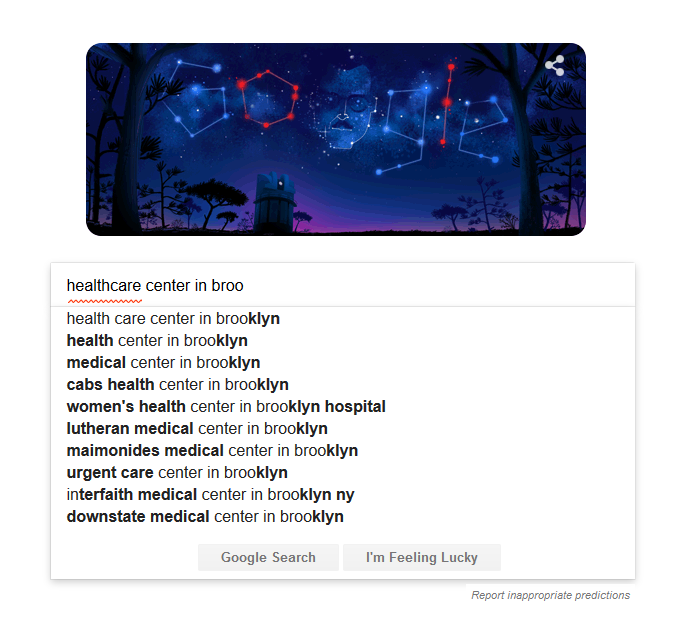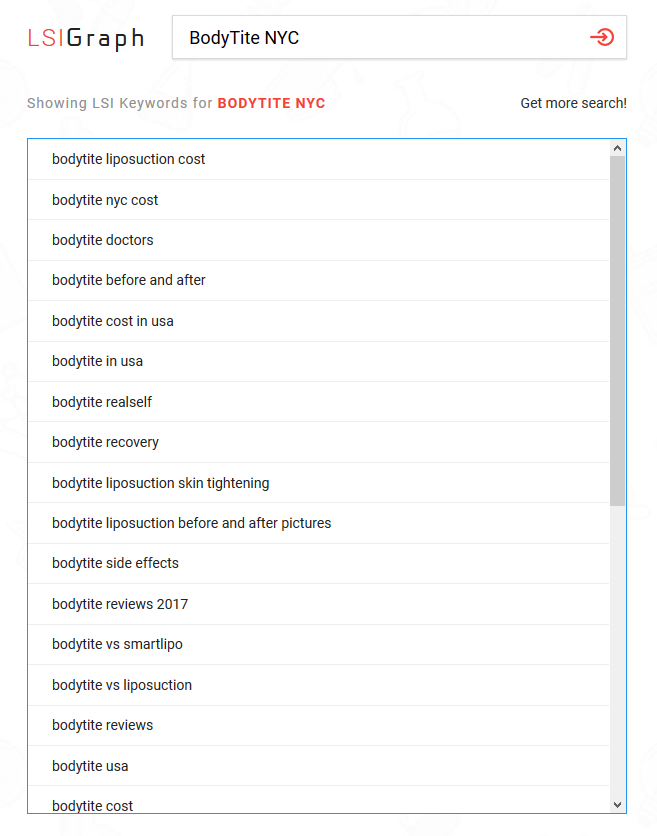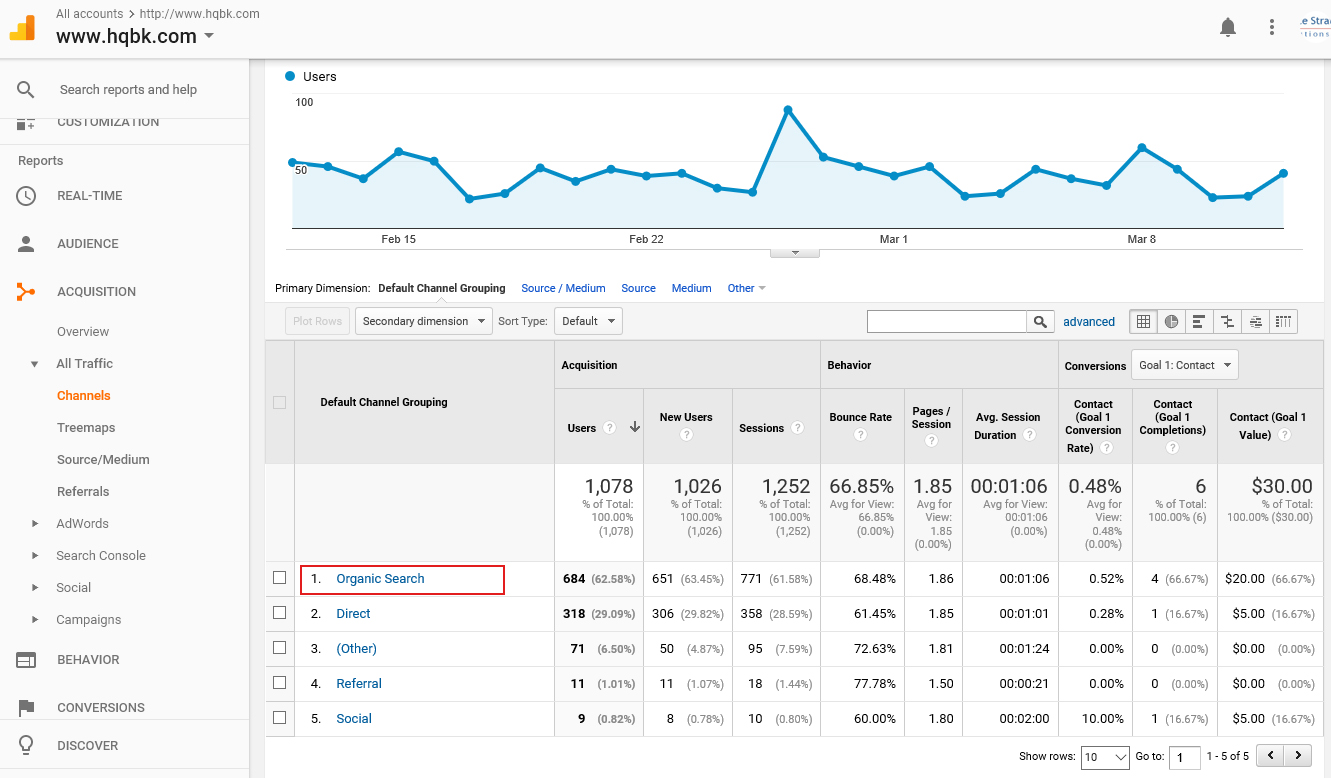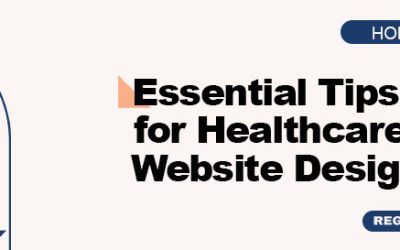With the growing popularity of medical searches and references in search engines, healthcare SEO is quickly becoming a necessity in today’s fast-paced world. Having your hospital or healthcare practice show up in organic search results is a great way to edge out competitors. But to make that happen you need a strong SEO campaign that targets potential healthcare consumers. Using relevant keywords helps users find your website easily and enables you to reach out more easily to your targeted audience. Keywords are an important SEO ranking factor which Google uses to decide the ranking of your content. If you use keywords in the proper manner, Google can easily understand what your content is all about, and highlight it at the right time in response to a search.
Keyword Research, the First Step in Healthcare Digital Marketing
Keyword research and optimization is the act of researching, analyzing and selecting the best keywords to target and drive qualified traffic from search engines to your website. It is the first step in digital marketing and by continuously performing keyword analysis and expanding your database of keywords you can improve site traffic, leads and sales. Researching keywords relevant to your business is the best way to understand what your customers are looking for, and decide on the right topics to include in your content strategy. This will help you provide the exact answers your target audience are looking for.
Keyword optimization could prove to be one of the most challenging tasks in search engine marketing. Search guidelines are constantly evolving, in keeping with a lot of changes in search behavior. For any health content marketing of email marketing strategy to deliver optimal results, marketers must understand how to research and use the most appropriate keywords.
What Are the Types of Keywords?
Before beginning keyword research, it is important to know the different types of keywords:
- Head keywords – These comprise only one or two words that have high search volumes
- Body keywords – are 2 to 3-word phrases with good search volumes, not high, not low
- Long-tail keywords – Consist of 4 or more words with low search volume
Sometimes, keywords are classified as “head,” “modifier,” and “tail” keywords; or “short,” “medium” and “long-tail keywords.”
Specificity or explicitness is what is important when deciding on your keywords. When performing keyword research, keep in mind local search that is of prime importance now as users prefer searching on their mobile devices. Adding a place name to your keyword as a modifier is useful because if your business serves a particular locality you can target a local audience.
Long-tail keywords are more specific, and if you optimize them it is very likely that your content will show up first during search. The more context you add to your keywords, the better will be your results.
- For example, if you search for “body-sculpting,” you will get millions of results.
Here you have about 1,52,00,000 results.
- Search for “body-sculpting NYC,” you will get more specific results related to NYC.
Here you have about 2,14,000 results.
- Search for “BodyTite body-sculpting NYC” and Google will return results pertaining to body-sculpting in NYC using BodyTite, and not other devices.
Here you have about 16,100 results
Semantic keywords are another category of keywords important to latent semantic indexing by Google. In other words, the search engine would use the context you provide with other search terms to decide what exactly you are looking for. See the screenshot below, where Google is trying to auto complete your search query.
At the bottom of the search results page, you can find related search terms, which also change when you change your search parameters. LSIGraph is a good tool for identifying semantic keywords. Keyword search for “BodyTite NYC” generated the following results.
Understand User Intent When Choosing Keywords
When researching keywords, you must understand the user’s intent. Only then can you provide the exact results the user is looking for. Typically, they may be looking for a healthcare website providing a particular service; or searching for the answer to a question they may have; or searching for information that will ultimately lead to them accepting the call for action.
Google’s search evaluation quality guidelines for 2017 list 4 types of queries:
- Know (including Know Simple): Know is about finding information and Know Simple is about finding a specific answer to a question
- Website: This query is aimed at locating and visiting a website
- Do (include Device Action): It involves performing an action or accomplishing a goal.
- Visit-in-person: In this case, mobile device users are planning a physical action based on search results.
Don’t Forget Voice Search
Voice search is an important consideration now. It has evolved over the years due to the rising use of mobile and other digital devices. According to Location World, 40 percent of adults now use voice search per day and as per Microsoft/Tech Radar, Cortana now has 133 million monthly users. The year 2017 saw the launch of Google’s voice-activated speakers. This shows that voice search is growing and you could rank higher with local optimization tactics and improve visibility.
Keywords in the voice search are long tail+, the “+” refers to the conversational phrases you need to add when optimizing for conversational voice search. Consider a keyword strategy that is more conversational in nature, and similar to how real people talk and ask questions.
Starting with Keyword Research
The first and foremost step of keyword research is brainstorm. You will have a good idea about the kind of information people are searching for in your own niche. Consider what you yourself would search for. It is best to use a spreadsheet for this as most of the keyword analytics tools allow exporting data as Excel or CSV files. Once you have decided on your keywords, use LSIGraph or such other tools to find related terms that you can add to your list. Use Google Analytics and Google Search Console to find out which search terms are already bringing people to your website. In Google Analytics, go to Acquisition ->All Traffic ->Channels and click on Organic search. If you have linked a Google Search Console account to your Google Analytics Accounts, then go to Acquisition-> Search Console ->Queries. You can find relevant keywords in blog comments and social media hashtags, among others.
Popular Keyword Research Tools
- Google AdWords Keyword Planner lets you calculate monthly global and local search volumes for keywords, competition levels and an estimated cost per click. Log in and go to Tools ->Keyword Planner, and choose one of the options under Find New Keywords, and Search Volume.
- SEO Profiler offers keyword research tools that help you identify the most relevant keywords for your website promotion.
- Keyword Spy is a downloadable tool that helps you identify competitors’ keywords as well as related terms that you can use.
- Bing Webmaster tools provides volume and keyword suggestions.
- Moz Keyword Explorer allows you two free searches a day. It allows you to search for keywords and filter results according to volume, similarity, and range of sources.
- Quora is a place to see the questions people ask and it is a great starting point for generating a good keyword list.
- SEMrush provides keyword data and helps to find keyword related to your main search terms.
- SEO Book Keyword Suggestion tool provides search volumes, related terms, estimated value and more.
- SERPS keyword research database is a free tool that lists associated terms and provides search volume, value, and cost-per-click for each keyword phrase.
- Wikipedia topics provide keyword ideas. It provides auto complete suggestions just as Google.
Using the Keywords
Once you have a list of the most relevant keywords, you can use them in many places in your content.
- Use keywords on both actual title and SEO title as these may be slightly different. The keywords determine the relevance and it is the clickable link that is seen in search results.
- Use keywords in your Meta description because if you are not using an SEO tool, then it will automatically come from the first 160 characters of the content. The meta description is found below the clickable link, and helps people decide whether to click or not.
- Use keywords in links and social media updates. If you are sharing site content, this may be part of the title but searches can be refined by adding appropriate hashtags which are also effective keywords.
Significance of Keyword Research and Optimization
Keyword research and optimization is important for:
- Analyzing the popularity of keywords helps you gauge the size of your potential online market.
- You get to understand the search behaviour of your customers and their requirements.
- Using optimized keywords in website content helps to connect with potential patients or customers easily and address their needs.
- Optimizing keywords help to drive searches to the website
The success of any website depends on effective SEO techniques and researching, analyzing and selecting the right search engine keywords for the website. Optimizing keywords touches upon all aspects of SEO marketing.
- Target keywords must be used in title tags and also in the content, both on and off page.
- To rank well and connect with the searchers, use of target keyword in the content is crucial. Word Stream for SEO helps to combine keyword research with content authoring.
- Use optimized keywords in the images used on your website
- Keyword optimization should be integrated into link building strategy. Internal links, inbound links, breadcrumb links, navigational links should have optimized keywords.
- Keyword optimization is also critical to how you structure and organize your site content. Select the right keywords and group them hierarchically and order the corresponding pages on your website accordingly.
A good healthcare digital marketing agency can help with your keyword research and identify the best keywords relevant for your healthcare business. They will provide keyword tracking services that will enable locating those keywords that require more attention and those that are driving more traffic to your website. This will also provide a clear idea regarding how your website is performing in terms of search engine results compared to competitor websites.


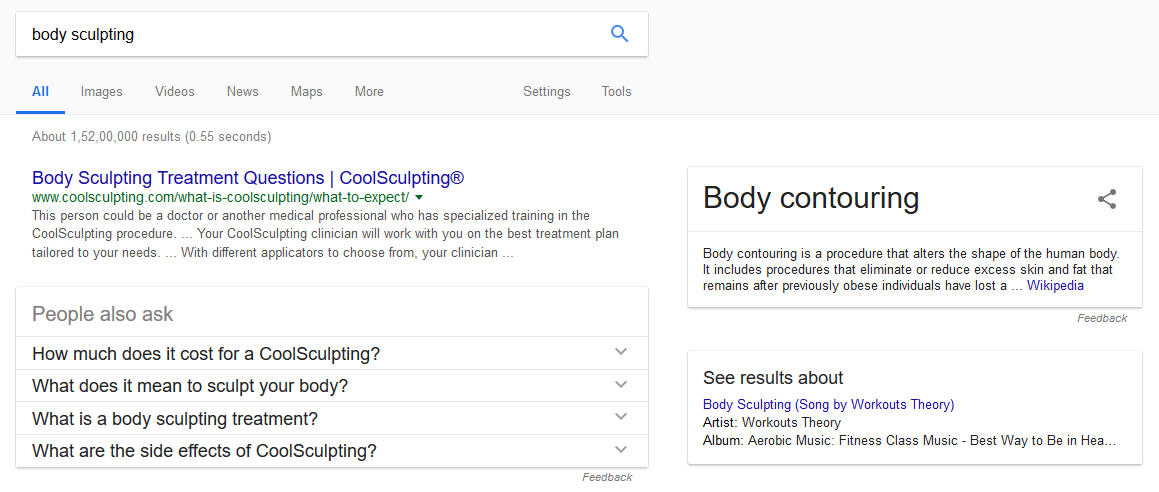 Here you have about 1,52,00,000 results.
Here you have about 1,52,00,000 results.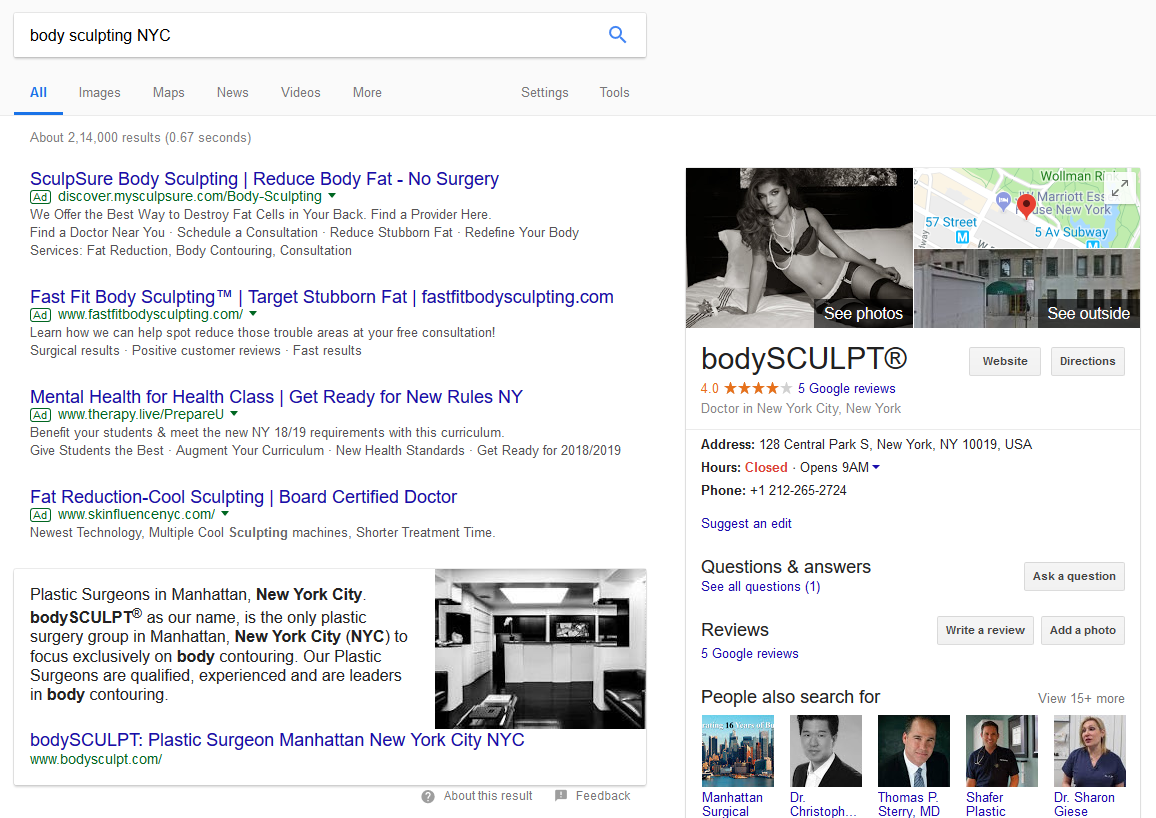 Here you have about 2,14,000 results.
Here you have about 2,14,000 results.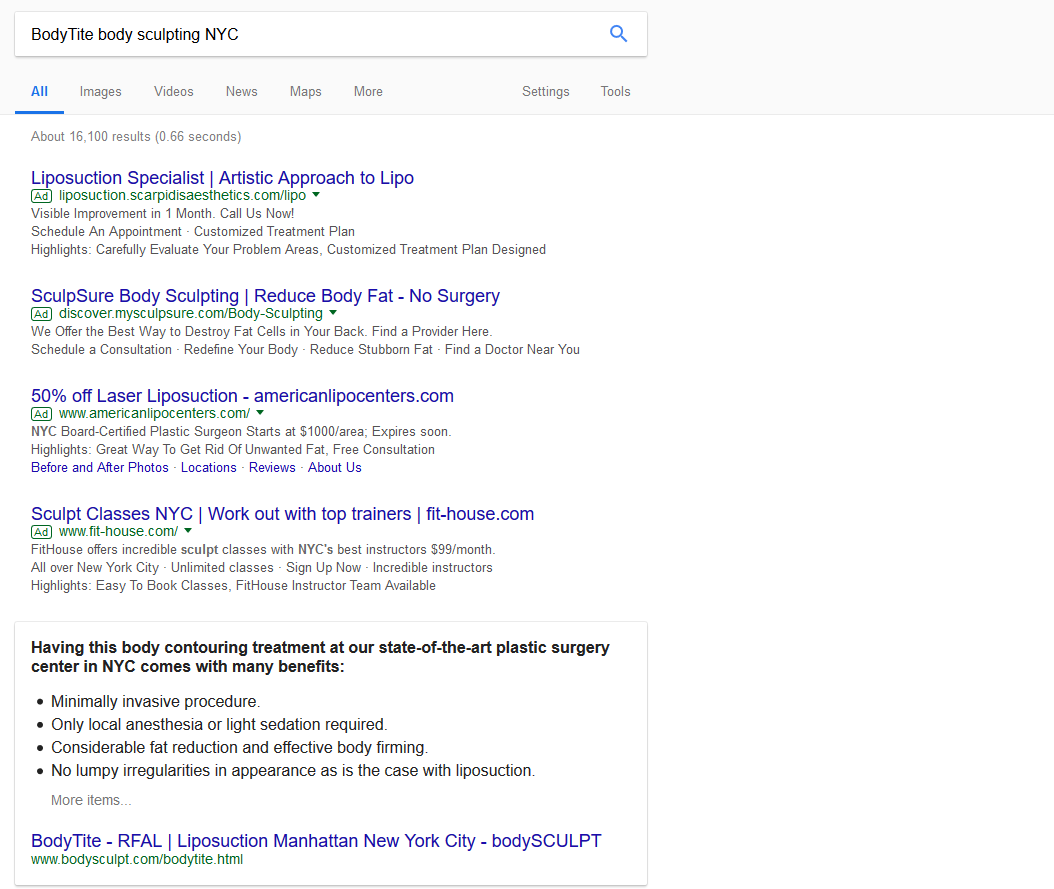 Here you have about 16,100 results
Here you have about 16,100 results